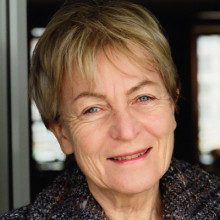Polish literature

Małgorzata Szejnert
(born in 1936) journalist, writer. University of Warsaw graduate (1958). Winner of Literary Public Media Award Cogito, Upper Silesia Tacitus, finalist of „Nike” Literary Award , Gdynia Literary Award and Angelus Central European Literature Award. One of „Gazeta Wyborcza” co-founders.
After graduating from university, she worked for the city section of the „Kurier Polski” daily and then as a reporter in „Tygodnik Demokratyczny” and as an assistant editor in the Polish diaspora monthly „Panorama Polska”. She was a contributor for the „Polityka” weekly. Her literary debut is a journalistic collection on the Polish community in the USA – Borowiki przy ternpajku (Ternpajk Boletes, 1972, 1974). In the years 1973-1981 she was a reporter and the editor of the journalistic section in the „Literatura” weekly. Her journalistic features from these years are collected in the volumes: Ulica z latarnią (Street with a Lamp, 1977) and I niespokojnie tu i tam (Restless here and there, 1980). Her piece Jeśli się odnajdziemy (If We Find Each Other, 1982) inspired the director Roman Załuski, who based his film of the same title on it. It is a story of an authentic and controversial pedagogical experiment of Maria Łopatowska. People who wanted to adopt children spent time with orphans, after the holidays spent together, some children found new parents and others returned to orphanages. In the 80s, she became involved in political opposition. After the introduction of martial law, she refused to work in official media and lost her position in „Literatura”.
In 1984 the underground publishing house NOWA published hers and Tomasz Zalewski’s book Szczecin: Grudzień, Sierpień, Grudzień (Szczecin: The August, the December) about strikes in Szczecin from August 1980, in which she herself took part as a reporter, and the fates of the strike committee members. In the same year Szejnert moved to the USA, where at first she worked as a cleaner and then as a journalist in New York’s „Nowy Dziennik” (“The New Daily”). In 1986 she returned to Poland. In 1988 she published an extended interview with the famous director, critic, theatre historian and the manager of the National Theatre in Warsaw, Bohdan Korzeniowski – Sława i infamia (Fame and Infamy). From 1990, she had been running the reportage section of „Gazeta Wyborcza”. She nurtured and trained many young reporters. After retiring, she started collecting materials for the book Czarny ogród (Black Garden, 2007), a journalistic story of worker quarters in Katowice – Giszowiec and Nikiszowiec. „It turned out to be an incredible place, in which many threads come together: of Silesia’s economic history, uprisings, plebiscites, very complicated occupation-time stories, stories of repressions against the Silesian population, deportations to Russia. Simply everything. Everything that happened in Giszowiec casts a light on the entire Silesia” [the author on Czarny ogród on the Znak publishing house website]. Two years later she published a journalistic book Wyspa klucz (The Island-Key), devoted to the history of Ellis Island, a small island on the coast of New York, that was known as the gateway to America. Since the beginning of the nineteenth century until the 1950s a station for immigrants coming to the USA was located on it. During this time around 16 million people passed through the island. Most of them spent only several hours on it, others, not meeting the conditions of immigrant laws, were quarantined and often deported back to their countries of origin. Today the island is home to the American Museum of Immigration.
BIBLIOGRAPHY
- Borowiki przy ternpajku (reportages on Polish Americans in the USA), Warszawa: Ludowa Spółdzielnia Wydawnicza, 1972; 2nd edition: 1974.
- Ulica z latarnią (reportages), Warszawa: Ludowa Spółdzielnia Wydawnicza, 1977.
- I niespokojnie tu i tam (reportages), Olsztyn, Białystok: „Pojezierze”, 1980.
- Szczecin: Grudzień, Sierpień, Grudzień (commentary, with Tomasz Zalewski as a co-author), Warszawa: Niezależna Oficyna Wydawnicza, 1984; 2nd edition: Londyn: „Aneks”, 1986; 3rd edition Szczecin: Walkowska Wydawnictwo, 2008.
- Sława i infamia. Z Bohdanem Korzeniewskim rozmawiała Małgorzata Szejnert (interview), Warszawa: „Pokolenie”, 1988; 2nd edition (extended) Kraków: Wydawnictwo Literackie, 1992.
- Śród żywych duchów (reportages on prisoners murdered in Rakowiecka Prison), Londyn: „Aneks”, 1990; Kraków: Znak, 2012.
- Czarny ogród (historical reportage), Kraków: Znak; Katowice: Miasto Katowice, 2007.
- Wyspa klucz (historical reportage), Kraków: Znak, 2009.
- Dom żółwia. Zanzibar, Kraków: Znak, 2011.
- My, właściciele Teksasu. Reportaże z PRL-u, Kraków: Społeczny Instytut Wydawniczy Znak, 2013.
- Usypać góry. Historie z Polesia, Kraków: Znak, 2015.
- Wyspa węży, Kraków: Znak, 2018
TRANSLATIONS
German:
- Der Schwarze Garten [Czarny ogród], tłum. Benjamin Voelkel, Potsdam: Deutsches Kulturforum, 2015